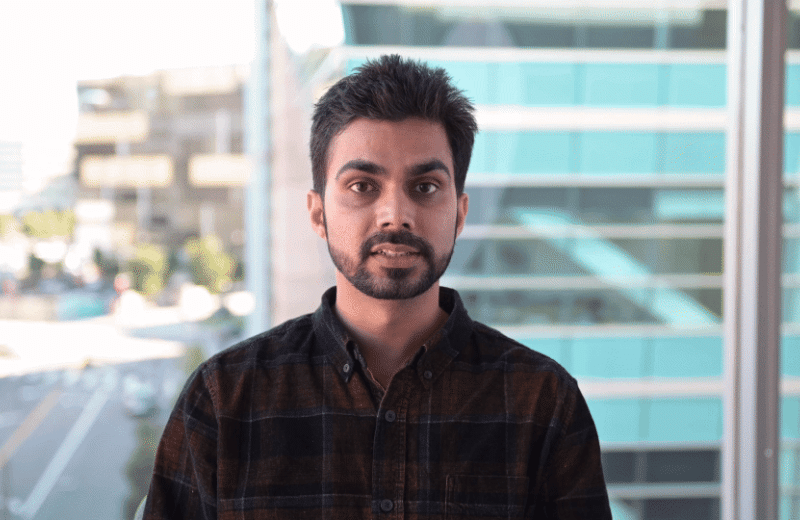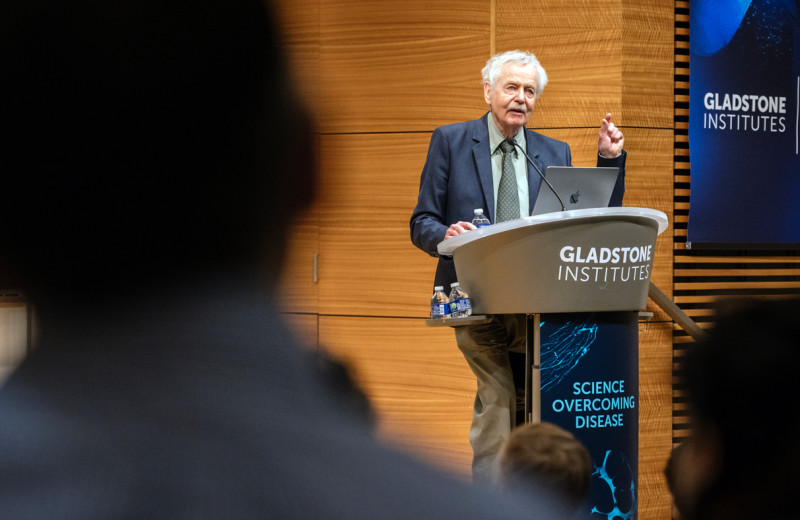Gladstone NOW: The Campaign Join Us on the Journey✕

Alexandra Clemente is a graduate student in the Neuroscience Graduate Program at UCSF. She works in the laboratory of Jeanne Paz, PhD, at the Gladstone Institutes. She joined Gladstone after earning her bachelor’s degree in biomedical engineering from Worcester Polytechnic Institute.
What brought you to Gladstone?
During my scientific career, I have focused on how scientific advances can benefit disease. Sounds a lot like Gladstone’s mission, doesn’t it? It was natural for me to gravitate here.
What do you like about Gladstone?
While the science is amazing and the research is interesting, it really comes down to the people. I'm lucky enough to work in an institute filled with smart people doing fascinating science. But beyond that, there is a sense of a supportive and collegiate community here. Science can be very rough, and at Gladstone, I know that I’m not facing challenges alone.
Were you interested in science as a child?
I wouldn’t stay I was necessarily interested in science, but I was interested in learning. As a child, I wanted to be a historian or an archeologist—I was hypnotized by documentaries on the History Channel. I come from a family of life-long learners who encouraged my interest in these things. The focus on science came through some great biology and chemistry teachers I had in high school, as well as the fact that I come from a family of medical doctors.
Why did you decide to go to graduate school?
My undergraduate degree in biomedical engineering somehow didn’t feel like a complete story to me. I had a sea of knowledge with a centimeter of depth and that wasn’t satisfying. I wanted to leave a Mariana trench of discovery somewhere on that ocean floor. I had worked in a neuroscience lab for a summer, and I loved it. I resolved that if I was to dig a Mariana trench in the ocean floor of human knowledge, it would have to be in neuroscience.
What or who influenced your decision to work in science?
My family is to blame for all of this. My father has a doctorate in political economics and my mother’s side of the family is full of doctors (dermatologists; if you walk by my desk any given day I can show you some of the most horrible images you’ve ever seen). Through them, I understood how fulfilling a life of learning could be.
What do you do when you are not working in the lab?
I dance, dance, dance. I’ve been doing flamenco for about 2 years now, and I absolutely love it. Anyone that has ever talked to me for more than 3 seconds has been preached to about the benefits of Zumba. I take two to four classes every week at the UCSF gym, and it has truly saved my life. I really enjoy the sense of community I get from both dance classes. Also, because I’m not naturally very graceful or coordinated, it forces me to live in the moment for a couple of hours each week. You can think of it as a form of meditation.
If you could learn to do anything, what would it be?
Sing! I sound like a 5-year-old, but I really wish I could express myself through song.
What is your hidden/unique talent?
I can play an instrument called “el guiro.” It’s basically a cheese grater that you play with a stick. You can hear it in salsa and other Latin music. Somewhere on YouTube, there is an old video of me playing it, but I’m not going to tell you how to find it.
Name one thing that not many people know about you.
One of my defining features is that I have a twin! My fraternal twin has blonde hair and blue eyes and looks nothing like me. She is an architect in Manhattan. Our bicoastal distribution is a blessing and a curse to my parents, because my hometown of Caracas, Venezuela is far from both cities, but they get a taste of the East and West Coasts! I’ve learned so many things from my sister, even about UCSF. Turns out, we’re really blessed with wonderful art and architecture at the Mission Bay campus. The gym building was designed by the prominent Mexican architecture firm Legorreta + Legorreta. The metal planks in front of the Mission Bay housing are from Richard Serra. My other half is always a great source of perspective and knowledge (and an apartment to stay in when I go to NYC!).
If you could meet any scientist from any point in time, who would it be and why?
While he wasn’t necessarily a “scientist,” I would like to meet Andrés Bello. Bello was a Venezuelan diplomat and philosopher back in old colonial times. He knew that thinkers and professional learners were valuable to society and crucial for progress. He also understood the value of cross-cultural interactions. He accompanied Alexander von Humboldt on part of his Latin American expedition, served as a Venezuelan representative in London, and basically developed the Chilean Civil Code. In fact, there are not one, but two universities bearing his name in South America.
Want to Join the Team?
Our people are our most important asset. We offer a wide array of career opportunities both in our administrative offices and in our labs.
Explore CareersMeet Gladstone: Shyam Jinagal
Meet Gladstone: Shyam Jinagal
Shyam Jinagal explores how genetics, aging, and regeneration shape the heart—and how those insights could one day restore heart function after injury.
Graduate Students and Postdocs Profile Cardiovascular Disease Srivastava LabA Sculptor of Modern Regenerative Medicine
A Sculptor of Modern Regenerative Medicine
Among his myriad accomplishments, Rudolf Jaenisch—winner of the 2025 Ogawa-Yamanaka Stem Cell Prize—was the first to demonstrate the potential of induced pluripotent stem cells to treat disease.
Awards Ogawa Stem Cell Prize Profile Regenerative Medicine Stem Cells/iPSCsMeet Gladstone: Shijie Wang
Meet Gladstone: Shijie Wang
Shijie Wang, a postdoctoral scholar in Steve Finkbeiner’s lab, uses artificial intelligence, robotics, and stem cell technologies to uncover how brain cells die in neurodegenerative diseases like Alzheimer’s and Parkinson’s.
Profile Neurological Disease Finkbeiner Lab AI Robotic Microscopy



